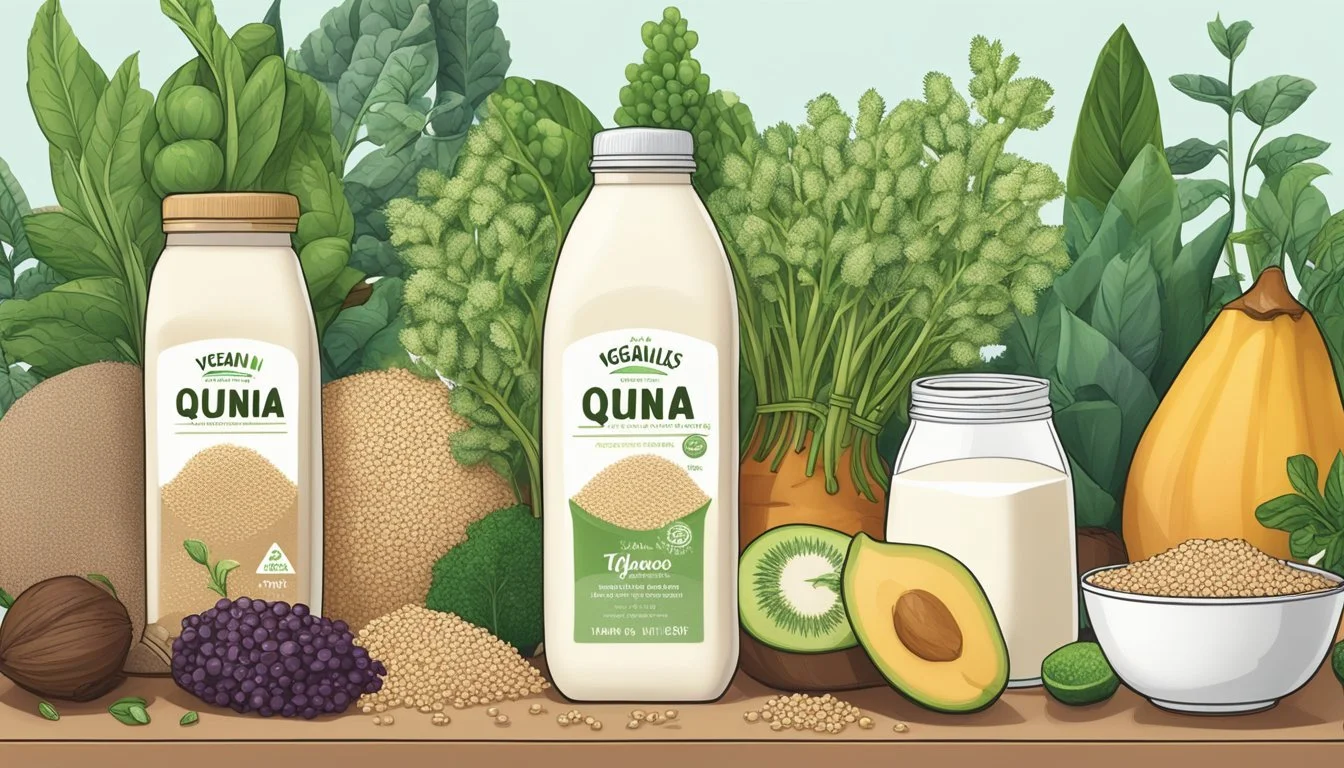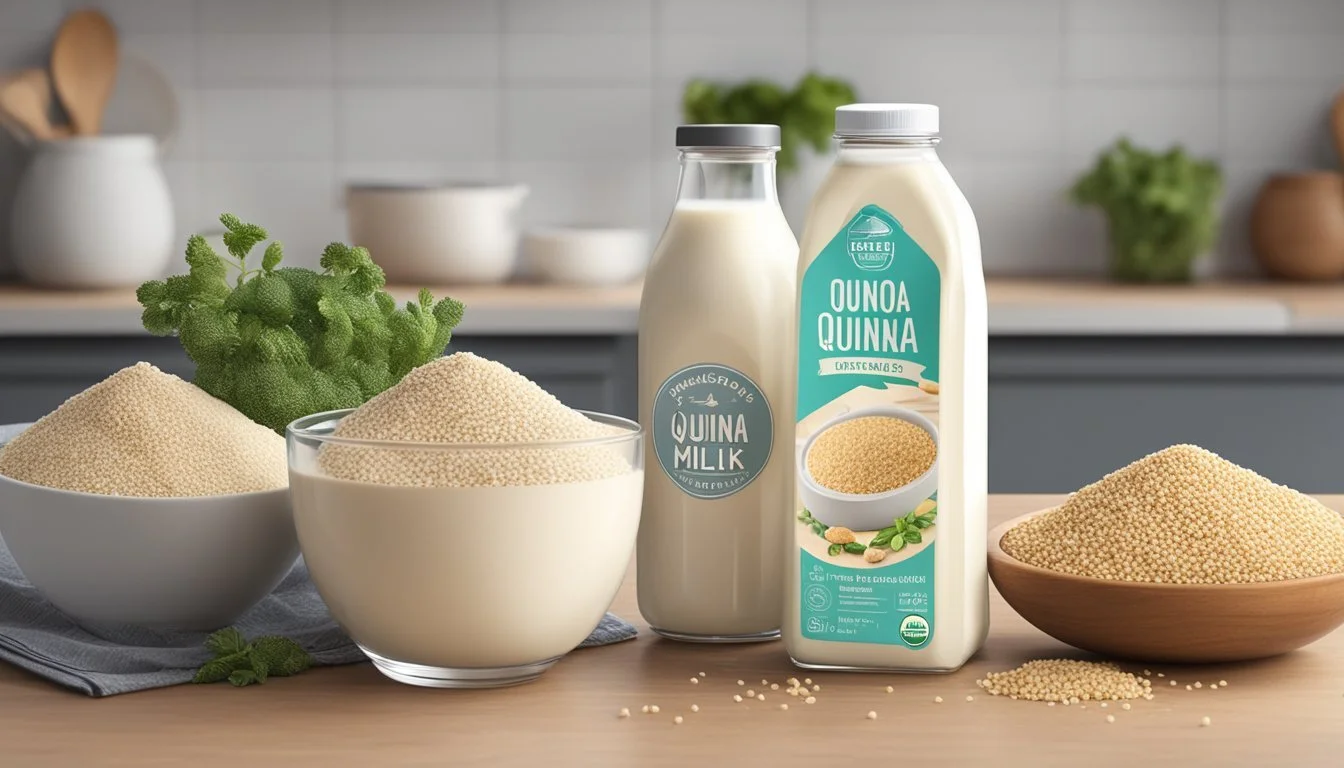Is Quinoa Milk Vegan?
Unveiling the Truth About This Plant-Based Alternative
Quinoa milk is a plant-based beverage derived from quinoa, a grain that is highly regarded for its nutritional profile. As a natural, dairy-free alternative to cow's milk, quinoa milk fits within a vegan diet, which eliminates all animal products for ethical, health, or environmental reasons. The process of making quinoa milk involves cooking the quinoa grains, blending them with water, and then straining the mixture to produce a milk-like liquid. This liquid can be enhanced with natural sweeteners like dates or cinnamon for added flavor.
The rise in popularity of plant-based milks has highlighted quinoa milk as a nutritious dairy alternative. Quinoa is known for being a complete protein source, containing all nine essential amino acids. Additionally, it is a good source of fiber, vitamins, and minerals. These properties make quinoa milk not only suitable for vegans but also appealing to those looking for a nutritious non-dairy milk option.
Considering its plant origin and production method, quinoa milk is inherently vegan. Its production does not involve any animal derivatives or by-products. Quinoa milk provides an option for those seeking to maintain a plant-based diet without sacrificing on nutrition or taste. With its creamy texture and nutty flavor, it's a versatile ingredient for a variety of vegan recipes, further expanding the culinary possibilities for those following a vegan lifestyle.
Quinoa Milk Basics
In the realm of plant-based milks, quinoa milk is a nutritious and vegan alternative that boasts a unique composition and array of benefits.
What Is Quinoa Milk?
Quinoa milk is a type of plant milk created by blending quinoa seeds with water. Its origin lies in the versatile nature of quinoa, a seed that is commonly prepared and consumed as a grain. Being a plant-derived beverage, quinoa milk is inherently vegan and suitable for individuals seeking dairy-free milk options. The process of making quinoa milk involves cooking the seeds, blending with water, and then straining the mixture to achieve a smooth liquid.
Quinoa Milk Nutritional Profile
Quinoa milk's nutritional value is impressive due to quinoa's status as a superfood. The milk is a good source of protein and essential amino acids, with a protein content that holds all nine essential amino acids necessary for human health. It is also rich in dietary fiber, which aids in digestion. Quinoa milk contains minerals like iron, potassium, calcium, phosphorus, magnesium, and zinc, which play vital roles in various bodily functions. From a vitamin standpoint, it is a source of Vitamin C and B vitamins. It’s important to note that the nutritional content can vary depending on the concentration of quinoa and the presence of other added ingredients like sweeteners, salts, or additional flavors.
Nutrient Benefit Protein Muscle repair, immune function Fiber Digestive health Iron Oxygen transport, energy production Potassium Nerve function, muscle contractions Calcium Bone health, cardiovascular function Carbohydrates Energy provision Sodium Fluid balance, nerve transmission Vitamin C Antioxidant, skin health, iron absorption Zinc Immune function, protein synthesis Phosphorus Bone health, energy metabolism Magnesium Muscle function, nerve function, blood glucose control Essential Amino Acids Protein synthesis, tissue repair
Quinoa milk stands out as a nutritious choice among plant milks, providing a well-rounded nutritional profile that supports overall health.
Health Benefits and Nutritional Advantages
Quinoa milk is a vegan-friendly alternative that offers a host of nutritional advantages, including a generous protein profile and essential minerals which make it particularly favorable for those following a plant-based diet.
Protein and Amino Acids Content
Quinoa milk stands out with its high protein content, making it a robust option for vegans and vegetarians who may seek additional protein sources. It contains all essential amino acids, which are the building blocks of protein not naturally produced by the body, thus fulfilling a crucial nutritional role similar to that of animal-based products.
Digestive Health
The fiber found in quinoa promotes digestive health by aiding in bowel regularity and preventing constipation. Unlike many other grains, quinoa can have a higher fiber content, which contributes to a feeling of fullness and may help in weight management.
Mineral Richness
In terms of mineral content, quinoa milk is particularly rich in iron and calcium, two minerals that are often lacking in vegan diets. Iron is necessary for the production of hemoglobin, while calcium is essential for bone health.
Mineral Importance Iron Oxygen transport and energy metabolism Calcium Bone strength and cardiovascular function
Low Allergenic Potential
Quinoa is also celebrated for its low allergenic potential, being naturally free from common allergens such as gluten. Its profile of polyunsaturated and monounsaturated fat, along with a minimal amount of saturated fat and cholesterol, positions it as a heart-healthy choice. Furthermore, the presence of essential vitamins like Vitamin A and Vitamin E adds to the overall nutritional value of quinoa milk.
Making Quinoa Milk at Home
Creating homemade quinoa milk is a simple process that involves preparing quinoa, blending it with water, and then adding natural flavors. It is a vegan-friendly milk alternative that can be stored easily.
Quinoa Preparation
One begins by thoroughly rinsing the quinoa to remove saponins, a natural coating which can impart a bitter flavor. The grains are then cooked in a saucepan. It typically takes about 15 minutes for the quinoa to become translucent and swell in size, indicating that it is ready for the next step. After cooking, it's important to let the quinoa cool completely.
Blending and Straining
The cooked quinoa is transferred to a blender along with water. It is vital to blend until the mixture is as smooth as possible. The next step involves straining the mixture using a cheesecloth or fine-mesh strainer to remove any residual pulp and debris. For a smoother quinoa milk, one might blend it longer in a high-powered blender, eliminating the need to strain.
Flavoring Homemade Quinoa Milk
To elevate the taste of homemade quinoa milk, natural sweeteners and spices can be added. Ingredients such as dates or maple syrup are excellent for sweetness, while spices like cinnamon or vanilla can add a unique aroma and flavor. A pinch of salt could also be introduced to enhance the overall taste profile.
Storing Homemade Quinoa Milk
The final product should be stored in a sealed container within the refrigerator. Homemade quinoa milk usually remains fresh for 3 to 4 days. For longer preservation, one can freeze the milk; however, remember to leave some space in the container for expansion. If separation occurs after thawing, simply shake or re-blend before serving.
Culinary Uses of Quinoa Milk
Quinoa milk is a gluten-free and vegan milk alternative with a mild flavor that can be enriched with natural sweeteners. It is versatile for cooking and baking and offers a nutritious option for various dietary needs.
Quinoa Milk in Recipes
In savory dishes, quinoa milk acts as a creamy, fat-free base, contributing a rich texture without the presence of dairy. Its low-fat content makes it a health-conscious choice for those monitoring their fat intake. It's particularly useful in vegan soups and can be added in the last minutes of cooking to preserve the milk's nutrients.
Breakfast Options
For breakfast, quinoa milk can be an excellent dairy-free substitute in cereal, imparting a subtle nuttiness that complements both cold and hot cereals. It’s a fitting option for those who follow a vegan or gluten-free diet, serving as a nutritious start to the day. The addition of natural sweeteners like dates can enhance its taste without the need for processed sugar.
Sweets and Desserts
When it comes to sweets, quinoa milk can be used in a range of desserts from baked goods like cookies to Caribbean recipes that call for a milk substitute. It contributes to the overall flavor profile while maintaining a dessert's desired consistency. It is also employed to create dairy-free frozen desserts, providing a creamy texture that mirrors traditional ice cream.
Quinoa Milk Compared to Other Plant Milks
When assessing quinoa milk in relation to other plant milks, it is necessary to explore its nutritional profile, taste, and the environmental factors surrounding its production.
Nutritional Comparison
Quinoa milk offers a unique nutritional composition when compared to other plant milks such as almond, oat, and soy. It stands out for being generally richer in certain minerals and vitamins. Unlike many nut milks, quinoa milk is high in calcium and phosphorus, and also provides a valuable amount of B vitamins like riboflavin (B2) and folate (B9). In contrast to oat milk, which tends to have higher carbohydrate content, and coconut milk, which can be higher in saturated fat, quinoa milk is relatively low in both, making it a suitable option for individuals monitoring their cholesterol levels. Additionally, unlike nut-based milks, quinoa milk naturally does not contain nuts, which is an important consideration for those with allergies.
Nutrient Quinoa Milk Almond Milk Oat Milk Coconut Milk Calcium High Moderate Low Moderate B Vitamins High Low Moderate Low Saturated Fat Low Low Low High Carbohydrates Moderate Low High Low
Taste and Culinary Use
Quinoa milk's taste is less pronounced than nut-based milks like almond or cashew milk, which makes it versatile for both sweet and savory applications. Its natural flavor is more understated, allowing it to blend seamlessly into recipes without dominating other ingredients. When compared to oat milk, which can impart a subtle sweetness and creaminess to dishes, quinoa milk is thinner and may be preferred for recipes where a neutral taste is desired. Its ability to complement a variety of flavors makes it suitable for a wide audience, including kids who might be sensitive to stronger-tasting alternatives.
Environmental Impact
The environmental impact of producing quinoa milk generally showcases a lower water footprint than that of nut milks such as almond milk, which is known for its higher water requirements. Plant-based milks, on the whole, are considered to have a lower environmental impact compared to cow's milk, with certain variations among them. Quinoa milk's production typically does not involve the same level of pesticides and land usage as some other plant milks, making it a more eco-friendly option for those concerned with sustainability. Additionally, most plant milks including quinoa milk, come with the added benefit of being cholesterol-free and devoid of preservatives, which are positive aspects for both health and the environment.
Shopping for Quinoa Milk
When selecting quinoa milk, buyers should consider its nutritional content and ingredient composition to ensure it meets their dietary needs. It is essential to identify natural, vegan-friendly options that align with specific health objectives.
Reading Labels
Consumers should scrutinize the labels on quinoa milk cartons, focusing on the list of ingredients and nutritional facts. Quinoa milk is inherently gluten-free and vegan, making it suitable for those with dietary restrictions. It's important to verify that the product is indeed vegan, as some brands might add non-vegan enhancers. Key nutrients typically found in quinoa milk include protein, fiber, iron, potassium, phosphorus, and magnesium. These are derived naturally from quinoa, a nutritious pseudocereal known for its health benefits.
Quinoa milk should ideally be free from preservatives and artificial additives. Buyers should also check the sugar content; some brands may add sugar, while others offer unsweetened varieties that only contain the natural sugars present in quinoa. The presence of saponins, which can impart a bitter taste to the milk, should be minimal since they are usually removed during processing. Different varieties of quinoa, such as white quinoa and red quinoa, might be used, influencing the flavor profile.
Avoiding Additives
Identifying quinoa milk without unnecessary additives is essential for maintaining a natural diet. Additives often come in the form of thickeners, artificial flavors, or extra sweeteners. To ensure the product is as natural as possible, one should look for a short list of recognizable ingredients. Additives can sometimes negate the health benefits of the beverage by introducing excess sugar or fat.
Furthermore, vegans must be extra vigilant to avoid any animal-derived ingredients disguised as natural flavors or supplements. Storage instructions are also a point of consideration; most quinoa milk options require refrigeration once opened to preserve freshness. Always check the expiry date to ensure the product has a reasonable shelf life, especially if not consumed quickly.
Quinoa Milk and Diet Considerations
Quinoa milk is a naturally occurring, vegan-friendly alternative to dairy that can suit various dietary requirements, offering a host of nutrients including protein, fiber, and essential minerals.
Integrating into a Vegan Diet
Quinoa milk, derived from the pseudocereal quinoa, serves as an excellent plant-based milk substitute for vegans. It is entirely animal product-free, aligning with the vegan diet's exclusion of dairy. Quinoa is esteemed in the vegan community for its protein quality, as it contains all nine essential amino acids, which are typically challenging to obtain from a single plant-based source. This vegan milk alternative not only adds variety to a vegan diet but also contributes valuable nutrients. For instance, it can provide vegans with a source of:
Protein: A crucial component for muscle repair and growth
Iron: Vital for forming healthy red blood cells
Calcium: Important for maintaining bone health
Magnesium: Helps with nerve function and muscular health
Phosphorus: Assists in the formation of bones and teeth
Suitability for Gluten-free Diets
For individuals following a gluten-free diet, whether due to celiac disease or gluten sensitivity, quinoa milk is an ideal option. Quinoa is naturally gluten-free and safe for consumption by people who avoid gluten. As a non-grain crop, it avoids the cross-contamination risks often associated with grains like wheat, barley, and rye. The nutritional profile of quinoa milk, which is rich in carbohydrates and fiber, helps provide the energy and digestive support that those on gluten-free diets need. Additionally, the various micronutrients found in quinoa milk, such as:
Magnesium: Aids in numerous biochemical reactions in the body.
Phosphorus: Supports the repair and maintenance of body cells.
Iron: Essential for oxygen transport in the blood.
These attributes make quinoa milk a healthy, gluten-free alternative that does not compromise on nutritional value.
Ethical and Cultural Aspects
Quinoa milk emerges from a nexus of ethical and cultural considerations, tightly bound with its origins and the sustainability of farming practices. These factors are integral to understanding how quinoa milk aligns with vegan principles and the impacts of its production.
Quinoa's Origins and Cultural Significance
Quinoa is not a grain but a pseudocereal, primarily grown in South America, with Bolivia, Peru, and Chile as the main producers. It holds a deep cultural significance among the indigenous peoples, for whom it has been a staple food for thousands of years. Known in its native regions as the "mother of all grains", quinoa has been celebrated for its resilience and nutritional value.
The rise in global demand for quinoa has highlighted ethical concerns regarding cultural appropriation and economic impact on traditional communities. The popularity of quinoa in the West has contributed to an increase in its price, which, while beneficial for some farmers, could potentially make this traditional food less accessible to the local population.
One of the key aspects of quinoa that appeals to the vegan community is its status as a plant-based protein source, being rich in all nine essential amino acids. As a plant milk, quinoa milk carries this heritage, presenting itself as an ethical choice for those avoiding animal products.
Sustainability of Quinoa Cultivation
Sustainability is a critical aspect when assessing the ethical profile of quinoa production. The plant's natural resilience allows it to grow in arid and inhospitable environments, making it a sustainable choice in areas prone to drought.
However, the increasing popularity of quinoa has led to changes in traditional farming methods. Some producers have expanded cultivation into previously uncultivated lands, which could threaten the region’s biodiversity and long-term ecological balance. It's also worth considering the resources required for quinoa milk production, such as water use and the environmental cost of packaging and transportation.
Vegans often seek out sustainable and ethical options, and in this regard, the sustainability of quinoa farming is a critical issue. While the plant itself is sustainable due to its hardy nature, careful consideration of cultivation practices is essential for ensuring that quinoa milk remains an ethical choice for a plant-based diet.






